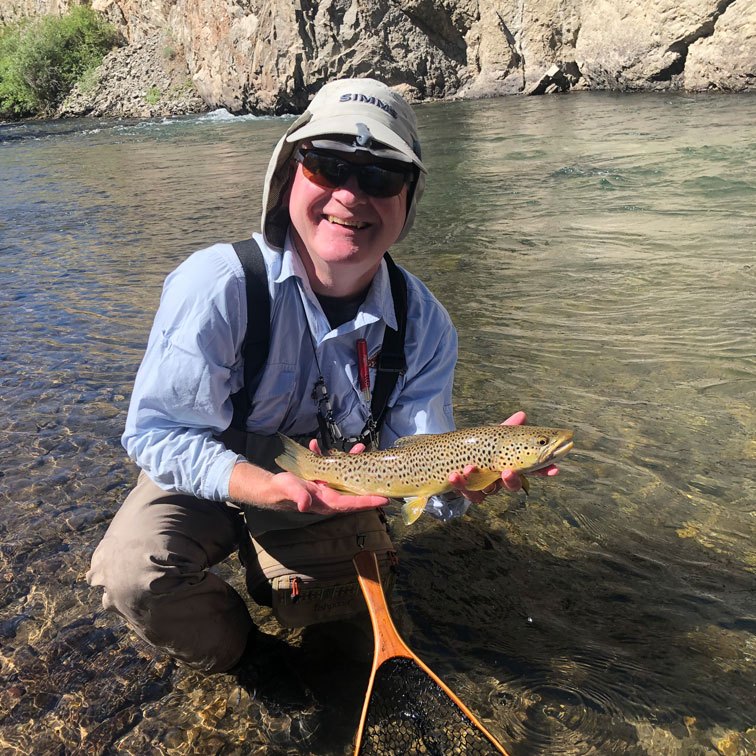
With apologies to the lost-to-history poet who wrote the original words to this Christmas favorite, and with my best wishes to you and yours this holiday season, I give you the Twelve Days of Christmas (the electric co-op edition).
On the first day of Christmas, my true love sent to me: An electric self-propelled two-stage snowblower.
On the second day of Christmas, my true love sent to me: Two heat pump water heaters and an electric self-propelled two stage snowblower.
On the third day of Christmas, my true love sent to me: Three smart thermostats, two heat pump water heaters, and an electric self-propelled two stage snowblower.
On the fourth day of Christmas, my true love sent to me: Four solar flashlights, three smart thermostats, two heat pump water heaters, and an electric self-propelled two stage snowblower.
On the fifth day of Christmas, my true love sent to me: Five gold rings! Four solar flashlights, three smart thermostats, two heat pump water heaters, and an electric self-propelled two-stage snowblower.
On the sixth day of Christmas, my true love sent to me: Six EV charging station maps, five gold rings, four solar flashlights, three smart thermostats, two heat pump water heaters, and an electric self-propelled two-stage snowblower.
On the seventh day of Christmas, my true love sent to me: Seven solar-powered battery banks, six EV charging station maps, five gold rings, four solar flashlights, three smart thermostats, two heat pump water heaters, and an electric self-propelled two-stage snowblower.
On the eighth day of Christmas, my true love sent to me: Eight-kilowatt wind turbines, seven solar-powered battery banks, six EV charging station maps, five gold rings, four solar flashlights, three smart thermostats, two heat pump water heaters, and an electric self-propelled two-stage snowblower.
On the ninth day of Christmas, my true love sent to me: Nine multiprong charger cables, eight-kilowatt wind turbines, seven solar-powered battery banks, six EV charging station maps, five gold rings, four solar flashlights, three smart thermostats, two heat pump water heaters, and an electric self-propelled two-stage snowblower.
On the tenth day of Christmas, my true love sent to me: Ten insulating socket sealers, nine multiprong charger cables, eight-kilowatt wind turbines, seven solar-powered battery banks, six EV charging station maps, five gold rings, four solar flashlights, three smart thermostats, two heat pump water heaters, and an electric self-propelled two-stage snowblower.
On the eleventh day of Christmas, my true love sent to me: Eleven LED smart bulbs, ten insulating socket sealers, nine multiprong charger cables, eight-kilowatt wind turbines, seven solar-powered battery banks, six EV charging station maps, five gold rings, four solar flashlights, three smart thermostats, two heat pump water heaters, and an electric self-propelled two-stage snowblower.
On the twelfth day of Christmas, my true love sent to me: Twelve StopWatt power savers, eleven LED smart bulbs, ten insulating socket sealers, nine multiprong charger cables, eight-kilowatt wind turbines, seven solar-powered battery banks, six EV charging station maps, five gold rings, four solar flashlights, three smart thermostats, two heat pump water heaters, and an electric self-propelled two-stage snowblower.
Happy Co-op Holidays to All!
Finding “awesome” in all corners of the state.
Many years ago, some creative type in the state tourism office of my home state of Kansas came up with a fantastic promotional slogan: “Kansas. Land of Ah’s.” (I don’t need to explain this, do I? Dorothy? Toto? Ruby slippers?)
And while the Kansas slogan may not be as clever as the more recent Nebraska tourism slogan (you know the one: “Nebraska. Honestly, it’s not for everyone.”), it’s still darned good.
As I traveled across much of our spectacular state this past summer for both business and leisure, I wondered: “What’s the Colorado tourism slogan?” Yes, the signs at our borders with neighboring states welcome folks to “Colorful Colorado,” but that’s not really an attention-getter, is it? Don’t we need a catchy slogan?
But then it dawned on me. I mean, just look around. We’re not exactly hurting for tourists. To the extent our state was ever a well-kept secret, those days are long gone. And while I could (and sometimes do) complain that Colorado has become too loved, rest assured there are still many, many magical places waiting to be explored, particularly in Colorado electric co-op country.
My summer travels started in July with a trip to Meeker to attend the annual meeting of White River Electric Association. The folks at White River throw a heckuva party that includes a community dinner and entertainment. After staying overnight in Meeker, Deb and I took the long way home over the Flat Tops Trail Scenic Byway, an awe-inspiring 82-mile drive that connects Meeker to Yampa (fittingly served by Yampa Valley Electric Association). From Yampa we headed south, and I spent a couple of hours fishing the Eagle River (in Holy Cross Energy service territory) before heading back to Denver.
A couple weeks later, we drove over to Grand Junction to attend Grand Valley Power’s excellent annual meeting. (It’s always great to see hundreds of co-op members show up to share a meal and hear co-op news.) The next morning, Deb and I stopped in Palisade to pick up some legendary peaches and enjoy a glass of wine at one of the wineries. We then drove through the heart of Delta-Montrose Electric Association territory on our way to Lake City, which is in the service territory of GCEA(Gunnison County Electric Association). We spent a couple of days casting flies on the Lake Fork of the Gunnison River and enjoying the rustic charm of Lake City.
Toward the end of August, I met a college friend for some hiking near Crested Butte (also in the service territory of GCEA). I’m sure everyone has their favorite hiking trail in Colorado, but for my money — and for the name alone — you can’t miss the Oh-Be-Joyful trail that runs along the stunning mountain stream of the same name. With the wildflowers, waterfalls, and views of Ruby Range, this trail is quintessential
Colorado. On the way back to Denver, we stopped for lunch in Buena Vista, the home of Sangre de Cristo Electric Association.
Getting back to work, in early September our team from CREA traveled to Falcon (in the service territory of Mountain View Electric Association) and Monte Vista (headquarters of San Luis Valley Rural Electric Cooperative). We presented our CREA “Town Halls” to the staff members and board directors at Mountain View Electric and San Luis Valley REC and had great discussions about CREA’s services and projects. Our steak dinners at Quincy’s in Monte Vista were superb!
My summer concluded with a recent trip to northeastern Colorado where I had the privilege of playing golf at an incredible course called Ballyneal, located just south of Holyoke in the service territory of Highline Electric Association. Sculpted from the sand hills of Phillips County, this links course is as authentic and challenging as any of the famed courses of Scotland or England. Ballyneal is one of the highest- rated courses in the world, and it’s a true gem on Colorado’s Eastern Plains.
These trips around Colorado reminded me how lucky I am to work for Colorado’s electric co-ops and how lucky we all are to live and work in this incredible place. As Denver Post founder and publisher William G. Bonfils once proclaimed: “’Tis a privilege to live in Colorado.”
Oh, and that tourism slogan? How about: “Colorado. Land of Awesome!”

Since the inception of the Colorado electric co-op program in the 1930s, the traditional path for delivering electricity to co-op members has largely remained the same: Power is generated at a central station power plant, transmitted across high voltage transmission lines, and finally distributed over a local system to end-use customers at their homes and businesses. While the source of the “central station” power varies from state to state, the basic system of generation, transmission and distribution (G,T&D) of electricity has looked the same for decades.
This “G,T&D” model will remain the path for most of the electricity consumed by Colorado’s electric co-op members for years to come; however, more and more co-op members are opting to generate electricity at their premises. They do this by using solar panels on their rooftops or other sources of power that are “behind the meter.” And, as is the case for most renewable energy generation, it’s not always available and fluctuates depending on weather conditions. With that in mind, there are two scenarios at play for a co-op member’s on-premise system: Excess generation and inadequate generation.
If a co-op member’s residential rooftop solar system produces more electricity than they consume, Colorado’s electric co-ops have agreed to — and state law requires them to — “net meter” the energy the co-op receives from member-owned solar arrays. Net metering simply means that when excess electricity is exported to the grid, the co-op member receives kilowatt-hour credits valued at the retail rate. A member of a Colorado electric co-op can reduce the amount of electricity they purchase from the co-op since the solar panels on their rooftops are producing at least some, if not all, of the power they require for their home or business. In this scenario, the co-op member who is generating excess electricity benefits from their use of the co-op distribution system to manage and credit their excess solar energy production.
Unless they are completely off the grid and are generating all the electricity they need, co-op members with rooftop solar systems must still be connected to the co-op’s distribution infrastructure. This ensures the delivery of electricity to their home or business whenever it is required — for example, during a string of cloudy days when their solar panels don’t generate adequate electricity. Electric co-ops have a legal obligation to maintain adequate facilities in order to provide reliable electric service to their members.
It’s true that the need for a co-op to purchase power from a wholesale supplier is decreased when its members generate their own electricity. However, the co-op is still responsible for maintaining a robust distribution system that will serve all the co-op’s members.
This raises an important question for Colorado’s electric co-ops (and other electric utilities): If an electric co-op member benefits from the poles and wires to provide electricity when the rooftop solar panels aren’t sufficient, but that member no longer buys any or as much power from the co-op, should that member be required to pay for the continuing maintenance and replacement costs of those facilities?
As more and more co-op members install solar arrays, the way that co-ops compensate their members for consumer-sited generation may need to be reexamined. With the increase in residential solar systems, co-ops receive less revenue from energy sales, but they continue to have expenses related to maintaining the distribution grid. Co-ops may also need to make new infrastructure investments to enable the storage of excess solar production to help meet peak demands for electricity in the afternoon.
There has been a lot of discussion recently about whether any changes need to be made to the existing net metering rules from both the perspective of solar installers and electric utilities. As not-for-profit utilities, co-ops aren’t incentivized to make a profit, but they still must meet their payrolls, run their trucks, and invest in system maintenance and improvements. These costs are shared among all co-op members.
Colorado’s electric co-ops go to great lengths to treat all of their members fairly and equitably, and they will continue to do so as they integrate more behind-the-meter, customer-sited renewable energy resources.

Since CREA is the trade association charged with protecting the interests of Colorado’s electric co-ops, one of our most important jobs is to carefully monitor the activities of the Colorado General Assembly. To that end, we deploy a top-notch government relations team that actively engages the legislature — from the moment the session starts in January until the end-of-session gavel falls in May. During that 120-day period, we have the backs of our members, and we do our best to defeat or mitigate legislation that, in the view of our members, is not in the best interests of Colorado’s electric co-ops.
Since we recently passed the halfway point of the 2024 session, some observations are in order.
First, while some progress has been made toward improved decorum and a better working relationship between the parties, there is still a lot of room for improvement. It’s understandable, and in fact laudable, that legislators are passionate about their policy positions. However, in too many cases passion turns into rancor, and policy arguments devolve into personal attacks. The ability to “disagree without being disagreeable,” as journalist Robert Estabrook once put it, is a skill set many legislators need to hone.
Second, the number and scope of bills that have been introduced this year relating to energy issues demonstrates the ongoing interest of the legislature in the power sector. These legislative proposals span a wide range of topics.
For instance, HB24-1246 would have required electric utilities to develop contingency plans to maintain the resilience of the electric grid in the event of a geomagnetic storm. Without going into a detailed explanation of what constitutes a geomagnetic storm, suffice it to say that such events can wreak havoc on the electric grid, possibly causing voltage problems or blackouts. While this bill was killed in its first committee, it nevertheless pointed out valid concerns with events that could impact the reliability of electric service.
SB24-039 would have included nuclear energy in the definition of “clean energy resources” for purposes of the Colorado law requiring the reduction of carbon dioxide emissions from the electric utility sector. The bill pointed out that nuclear energy is the largest source of carbon-free electricity generation in the United States today. The 54 nuclear power plants (93 reactors) currently in operation produce about 50% of the country’s carbon-free electricity. This bill was also killed in committee.
CREA supports HB24-1173, legislation that would expedite the process for the permitting of electric vehicle charging stations. The bill requires counties and cities to act promptly when considering applications for EV charging stations. Electric co-ops are ready and willing to serve the growth of EVs around the state and more charging facilities are needed to sustain that growth. We think a more standardized process may facilitate the build-out of EV charging stations.
As of the writing of this column, the most significant energy bills in the 2024 legislative session have yet to be introduced. By the time you read this, it’s likely that another bill advancing the clean energy transition will have been introduced that will accelerate the goal of 100% clean energy by 2050 (a goal the legislature set in 2023) to 2040.
CREA staff has been engaged with the discussions leading up to the introduction of this bill and made every effort to mitigate the impacts of the bill on electric co-ops. We will always push back against proposals to expand the jurisdiction of the Colorado Public Utilities Commission over electric co-ops. Electric co-ops are rightly governed by their locally elected boards, and we will always advocate for the least regulatory oversight in how co-ops are governed and managed.
Finally, we also understand a bill will be introduced that is intended to expedite the siting of facilities needed for the clean energy transition, i.e., wind and solar farms, transmission lines, and other new facilities. CREA participated in a series of meetings on this topic last year and discussed our member co-ops’ experience in siting traditional facilities for power production and transmission. It will be interesting to see whether the historic challenges associated with the siting of power plants and transmission lines (the “not-in-my-backyard” or NIMBY problem) will be any different in the context of renewable energy projects.
Every session of the Colorado legislature has a unique set of challenges, and the 2024 session is no different. We will continue to fight the good fight on behalf of Colorado’s electric co-ops, but always respectfully and with the goal of reaching win-win solutions. Our members expect and deserve nothing less.
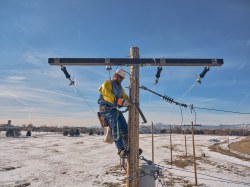
As I write this piece in mid-January, many parts of Colorado are experiencing significant snowfall and brutally cold weather. For some 80 hours, the temperatures east of the Continental Divide dipped below zero, and in many parts of eastern Colorado, the windchill hit the minus 30 degree mark.
Extreme weather is one example of a condition that can impact the resiliency of power grids. You might be surprised to learn that “resilience” isn’t exactly used to describe the major changes affecting electricity service. Instead, it’s about actionable steps electric utilities are taking to keep power flowing.
Although the terms “resiliency” and “reliability” are similar, reliability is a measure of electricity availability, while resiliency refers to the ability of electric grids to withstand stress.
More powerful and frequent natural disasters call for all electric utilities to learn new ways to do their job. These days, maintaining the power grid means planning for sudden and large-scale disruptions.
If you’re not sure what the difference is between “reliability” and “resilience,” you’re not alone. Even utilities can have slightly different definitions. But most tend to agree that grid resiliency is the ability to withstand and recover from disruptive events and to predict and adapt to ensure consumers have the reliable power they need in a time of new energy challenges.
A less-formal definition from the Future Electric Utility Regulation Advisory Group compares electric service to a boxing match: “Reliability is when you can take a punch. Resilience is how fast you get up off the canvas after you’ve been hit hard.”
While most of us can stay inside and avoid dangerous extreme weather conditions, there are many Coloradans whose occupations require them to brave the elements. Among these folks are the many ranchers, farmers, and truckers we depend on to keep the shelves in our stores stocked. It also includes the hundreds of utility workers who keep the electricity and natural gas flowing to light and heat our homes.
Electric co-op lineworkers are used to working in harsh conditions and at all times of the day and night, but working in heavy snow and bitter cold is especially difficult. Mechanical things that work reliably in milder weather are susceptible to breaking in cold weather; repairs to that equipment can be extremely difficult under those conditions. Lineworkers have to be ready to answer calls to restore outages in the middle of the night and during difficult travel situations.
Electricity is more important than ever to our daily lives. At the same time, severe weather can result in widespread outages that threaten the comfort and safety of many co-op consumers. Electric co-ops are ready to get back up off the canvas quickly: They’re burying more power lines underground, and they’ve developed outage recovery plans that get the most essential services back online first.
And while there is always an urgency to restore power as soon as possible, especially in extreme weather conditions as we saw last month, the first priority of every Colorado co-op and every lineworker is the safety of their crews as they perform this important work. There are no shortcuts when it comes to safety. All lineworkers must follow the lifesaving safety rules, especially during extreme conditions.
Colorado co-op lineworkers, as well as all utility workers and others who keep us safe and warm during bitterly cold weather, deserve a special thanks from all of us. They are true heroes; please say “thanks” the next time you have a chance.

Lowering the Temperature
The start of every new year in Colorado means the start of another session of the Colorado General Assembly. This year, the second regular session of the 74th General Assembly will convene on January 10, and, given the 120-day limit established in the Colorado Constitution, it will adjourn on or before May 8.
The 2024 legislative session will mark the 40th year that I have been involved with Colorado’s legislative process. After graduating law school in the spring of 1984, I moved to Colorado to take a job as a staff attorney in what was then called the Legislative Drafting Office, one of the nonpartisan staff agencies that support the work of the Colorado legislature. Now called the Office of Legislative Legal Services, this agency drafts the hundreds of pieces of legislation — and thousands of amendments — that are considered each year by the legislative body.
After working for the legislature for a few years, I went into private law practice and continued to do work involving ballot initiatives and other legislative matters. For the last 27 years, I have represented the interests of Colorado’s electric co-ops at the legislature, either as CREA’s general counsel or executive director. I have testified on various pieces of legislation in many different committees on dozens of occasions and worked with hundreds of legislators in both houses and on all sides of the political spectrum. I have enjoyed this work tremendously, and I have a deep reverence for our representative democracy that manifests itself through our legislative process.
So, it concerns me when I witness what has been going on in our legislature for the last several years. This is not a criticism of any individual legislator or political party, and it’s not a criticism of any policy that the legislature has adopted. No. My concern is for what I consider to be a basic lack of good faith and common courtesy that is pervasive at our legislature, an unwillingness to think about or consider a different point of view or to work to compromise in a way that respects multiple points of view. I understand that elections have consequences and that parties in the majority have the right to focus on their legislative agenda. But that does not mean that the views of the minority party, and the millions of Coloradans it represents, should be ignored or discounted.
Of course, another plague on our legislature is the prevalence of social media and the many platforms for expression that too often lend themselves to showboating and the airing of petty grievances. To be honest, I think it would be great if all legislators would choose not to post on X. (I guess those are no longer “tweets”?) There are very few issues that lend themselves to effective debate in spurts of 280 characters.
It used to be that I would look at our dysfunctional U.S. Congress and be grateful that my work involves the state legislative process where bills are heard in committee, votes are taken, and some semblance of legislative order prevails. This is still largely true in Colorado, although in too many cases the fate of bills is predetermined. Committee hearings are largely exercises in “checking the box” with no true opportunity for debate or discussion. It has become the norm in recent years for witnesses in committee hearings to be limited to two or three minutes of testimony, hardly enough time to explain positions on complicated pieces of legislation.
There is no doubt in my mind that this difficult legislative environment has caused many folks who considered running for the legislature to change their minds. It has also caused at least two new legislators to resign; this is a huge loss for the body and a sign that things must change. Thankfully, the leaders of both parties in both houses recently met to discuss how to address the lack of civility at the state Capitol; hopefully, this is the start of a bipartisan effort to quash the theatrics and focus on the work of legislating to benefit all Coloradans.
Despite these challenges, CREA will continue to work every day to represent the interests of Colorado’s electric co-ops and the consumer-members they serve. We will continue to do our part in 2024 to promote the civil exchange of ideas and to support the efforts of legislative leadership to lower the temperature under the Gold Dome.
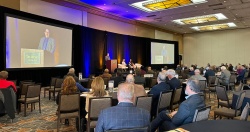
For the last 14 years, CREA has produced the Energy Innovations Summit, an annual conference that we host in the Denver area for those interested in the business of electricity and how it’s generated and consumed. At the Summit, we bring speakers from across the country together to present and talk about current industry developments. Given the dynamic nature of the industry, we want to make sure our members — Colorado’s electric co-ops — have the information they need to successfully serve the consumer-members at their individual co-op.
At this year’s Summit, which was attended by more than 250 people who are interested in the energy industry, experts addressed topics including hydrogen, nuclear fusion, advanced geothermal energy, artificial intelligence, and quantum computing. All these technologies may impact the way that electricity is delivered by Colorado’s electric co-ops in the coming years.
Our focus on innovation at the Summit is just another reflection of our membership:
Colorado’s electric co-ops are hard at work innovating and providing unique solutions to the energy needs of their consumer-members.
There are many examples of innovation at work in the electric co-op community. At the power supply level, all the companies that generate bulk power for electric co-ops are revamping their generation portfolios to rely more on renewable resources (such as wind and solar) and less on fossil fuel-fired plants. That said, it’s likely that a significant portion of the power supply picture in Colorado will depend on natural gas-fired plants for some years to come. While battery technology is improving, long-duration batteries that can provide backup power for days at a time are still in the experimental stages.
On the distribution side of the industry, local electric co-ops are quickly integrating many new technologies and innovations that will ensure they can provide affordable, reliable, and resilient electric service. Whether it’s deploying heat pumps, supporting energy-efficiency upgrades, developing microgrids, or installing EV charging stations, electric co-ops are always looking for ways to deploy technology that will improve the quality of life for the Coloradans they serve.
Given the devastation caused by recent wildfires in co-op service territories (none of which were caused by co-op power lines), co-ops are also using new tools to mitigate the risks posed by wildfires. These tools include more fire-resistant poles and wires and the use of cameras and drones to monitor and inspect co-op facilities. Co-ops understand the need for their communities to have access to affordable, reliable, and resilient electricity, and they do everything in their power to make that happen.
The Energy Innovations Summit is not only a great learning forum for our cooperatives, it’s also a great opportunity for members of our electric co-op family to meet and talk to people from other organizations who have diverse perspectives. It’s important for all stakeholders in the energy space to understand the priorities and needs of others to shape energy policy that works for everyone.
While the focus of the Energy Innovations Summit is on the future and how electricity will be generated and distributed five, 10, and 20 years into the future, Colorado’s electric co-ops must be focused on how to deliver reliable and affordable power today. Co-ops provide a critical service across Colorado and are, in a very literal sense, the lifeblood of the communities they serve. While there are many new proposed technologies and business models in the electric industry, co-ops must make sure that whatever they do, they keep the lights on for their members at a price they can afford.
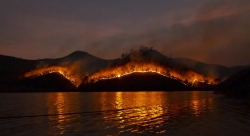
What can Colorado’s electric co-ops do to mitigate risks in our communities?
With each passing day, the toll of the devastating wildfire that swept through the town of Lahaina on the Hawaiian island of Maui on August 8 becomes clearer. As I write this column, the death toll exceeds 100, but it seems likely to go much higher as recovery efforts continue in what’s left of the town. In addition to the loss of life, it’s clear that the property damage will be in the billions of dollars, and the impacts on the culture and history of Lahaina are incalculable. I’m sure I speak for everyone associated with the Colorado electric co-op community in extending our sincere prayers to those who were lost and their friends and families.
As the initial shock of this event wears off, many people are asking questions about what caused the disaster and whether anything could have been done to mitigate the terrible outcome. Some have suggested that emergency warning systems should have been deployed to alert people to the oncoming fire. Others have questioned whether the local electric company could or should have preemptively de-energized parts of its electric system when the hurricane-force winds began.
There will no doubt be many investigations about these matters, but it would be irresponsible for me or anyone else so far removed from the Maui fire to weigh in without all the facts; blame and speculation will not bring back loved ones or restore property.
At this writing it’s not clear what ignited the fire, but one possible cause is downed power lines. As we have seen in similar circumstances in other states, high winds can have a devastating effect on power lines despite the efforts of electric utilities to maintain and care for those facilities.
Unfortunately, this tragedy paints a horrifying picture of the risks that many Colorado residents face every day in our wildfire-prone and windy state. In fact, a recent study concluded that over 300,000 homes in Colorado are at higher risk of wildfire damage since they are situated within the wildland-urban interface, including the foothills west of Denver, Boulder, Fort Collins, Colorado Springs, and Pueblo. As we saw with the Marshall Fire that devastated communities in Boulder County and with the Waldo Canyon Fire that destroyed hundreds of homes in Colorado Springs, wind-driven conflagrations can happen literally in the blink of an eye.
So, what can Colorado’s electric utilities do to lessen the chances of one of these heartbreaking catastrophes? While there is no perfect solution, utilities are working hard to protect their communities while keeping the lights on. Your local electric co-op works diligently with state and local governments to identify high-risk areas and to encourage homeowners to clear brush and trees away from their residences. It also means the deployment of many types of technologies to mitigate the risks, anticipate equipment failure, and detect fires at an early stage. In some cases, Colorado’s electric co-ops have developed microgrids to ensure that power is maintained during natural disasters including wildfires.
You may hear the suggestion that all existing electric utility lines should be moved underground; this practice is typically only used with new facilities. Unfortunately, this is not practical in many areas, and it would cost billions of dollars and take decades to achieve. Most electricity consumers would not support the rate increases needed to undertake extensive undergrounding of power lines.
Some Colorado electric utilities are also deploying a program of “public safety power shutoffs,” which means that in very limited circumstances a utility will de-energize one or more circuits on its system in anticipation of certain weather events. This is done to limit the potential for fire ignition in the event poles and wires are toppled in a storm. While utilities never want to shut off power delivery to their customers, in some cases that may be the more prudent action to avoid a much worse situation. In California, for instance, Pacific Gas & Electric recently reported to the state’s public utilities commission that a shutoff will significantly lower the risk of wildfires ignited by utility equipment.
The scenario that unfolded on Maui is the worst nightmare for every CEO, board director, and employee of every electric utility in this country. In Colorado, many electric co-op communities have been significantly impacted by wildfires in recent years — we are keenly aware of the risks. Co-ops remain vigilant and are doing everything possible to protect our communities.
Light Up the Navajo Nation: Concern for Community reaches beyond Colorado Light Up the Navajo Nation
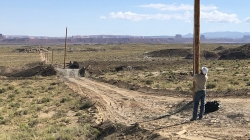
In previous columns, I have written about CREA’s efforts to send Colorado electric co-op lineworkers to rural Guatemala to bring electric service to remote villages. Working with our partners at the Oklahoma Association of Electric Cooperatives and NRECA International, we have sponsored three trips to Guatemala that resulted in the “electrification” of hundreds of homes, schools, and churches in one of the poorest regions of Central America. We’re sponsoring another trip this summer to send two co-op employees back to Guatemala to help complete the inside wiring of more homes.
We believe strongly in the international program and all the benefits that it brings to people without electric service outside the United States. Recently, however, we learned about a similar need that exists much closer to home in the Navajo Nation that spans parts of northeastern Arizona, northwestern New Mexico, and southeastern Utah. While most citizens of the reservation have electric service, there are still approximately 13,000 Navajo households that do not have electricity.
To remedy this situation, the American Public Power Association and the Navajo Tribal Utility Authority launched the “Light Up Navajo” initiative in 2019. The objective of the project is to provide electric service to Navajo families who currently live without electricity. Many municipal utilities and electric co-ops are working with NTUA to extend power lines to people who want the service.
One of the electric co-ops that sent crews to work on the project is Montrose-based Delta-Montrose Electric Association, a member of CREA. I was recently invited to observe and (to a very limited extent) participate in Light Up Navajo IV and I came away from the experience with a couple of main thoughts.
First, it’s hard to conceive that in the year 2023 there are thousands of people in any community in the United States who don’t have access to electricity. As electric co-ops, we pride ourselves on our eight-decade history of bringing electricity to rural America knowing that service would not have been provided by investor-owned utilities. That was the primary goal of the REA program when it was initiated in 1936: to bring light to America’s farms and ranches just as it was provided in the cities.
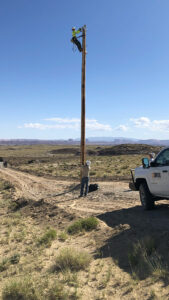
But it’s clear to me that while the electric co-op program was and is a huge success, a dire need still exists on Native American reservations such as the Navajo Nation. To the extent we can help serve this need, we can and should meet that call.
Second, I will never cease to be amazed by the skill and dedication of Colorado’s electric lineworkers. When I arrived at the job site just north of the town of Many Farms on the Navajo Nation reservation, I got there just in time to meet the convoy of trucks and heavy equipment. It was about 2:30 p.m. on a Sunday afternoon and I assumed that the crew would drop off the poles and other equipment for the job and then get started Monday morning.
What a ridiculous assumption!
The DMEA team, working with a municipal utility crew from Utah, immediately began unloading the twelve 40-foot cedar utility poles from two trailers and laying them down at the appropriate intervals to cover the mile-long stretch of line that was to be built. Over the next eight hours, working well after the sun set (and with the aid of lights on the truck), the crew used a digger derrick to dig the holes, set and true up the poles, tamp and backfill the holes, and do everything else needed to prepare the poles for wiring the next day. When all 12 poles were installed, they were so straight that if you stood behind a pole at one end of the project site, you couldn’t see any of the other 11 poles!
On day two, the crew came back to the job site and, in a few short hours, installed all the wires that would connect the power line to the grid at one end, and to the home that would receive the new service on the other end. It was a thing of beauty to watch the DMEA crew orchestrate the unspooling of both the ground wire and the phase that would become energized and install both of those wires, nearly a mile in length.
Colorado’s electric co-ops exist to improve the lives of our members and to enhance our co-op communities. We operate and serve under the co-op principle of Concern for Community and that service extends beyond our co-op communities. We will continue to find opportunities to serve others both outside the United States and closer to home.

By Kent Singer, CREA Executive Director
If you are familiar with Shakespeare’s Henry V, you may recall King Henry’s exhortation to his troops at the siege of Harfleur during the Hundred Years’ War. The city walls have been weakened by a long assault and the English troops are sick and exhausted, but Henry urges them to muster all their strength and fortitude for a final, victorious charge.
Okay, I admit it’s a little melodramatic to compare CREA’s lobbying efforts with the Hundred Years’ War. However, as we look back at the recently concluded 2023 legislative session of the Colorado General Assembly, you should know that the CREA government relations team once again “entered the breach” (in this case, the doors to the State Capitol) to protect the interests of Colorado’s electric co-ops.
As compared with past sessions, energy policy played a secondary role in 2023 while the legislature focused on social issues such as gun control, abortion, tenant’s rights, and healthcare costs. There were bills intended to accelerate the transition from fossil fuels to renewable sources of power, but much of the policy movement on that front had already been decided during the 2019 legislative session.
When the session adjourned on May 8, legislators had introduced 610 bills. Of that number, CREA staff actively “engaged” on 42 bills. This means we either worked to support, oppose, or amend the legislation based on our evaluation of the impacts on electric co-ops and ultimately the vote of the CREA Board of Directors.
On the energy policy front during the 2023 legislative session, the General Assembly convened a “Joint Select Committee on Rising Utility Rates” to investigate the cause of the high heating bills that many Coloradans were hit with in late 2022 and early 2023.
Although the Committee’s focus was to explore why customers of Colorado’s investor-owned utilities were impacted by these charges, we made sure the Committee understood this was not a co-op problem.
We made it clear to the legislators that, for the most part, electric co-ops do not provide home heating services and that our rates have remained stable. As a result, a bill that was introduced by the Committee to further regulate investor-owned electric utilities did not affect electric co-ops.
We also were successful in pushing back on a bill (HB23-1282) that we believe would have resulted in frivolous lawsuits against electric co-ops. Electric co-op consumer-members are already protected from unfair or unjust rates under Colorado law, and there was no reason to call them out under the Colorado Consumer Protection Act. We garnered bipartisan support to defeat this bill, and we’re thankful to the many legislators who supported our position.
Another bill that we worked on for months was SB23-292, a bill that establishes new requirements for energy sector construction projects. SB23-292 requires that, when certain types of energy projects such as generating plants and transmission lines are constructed, contractors must pay prevailing wages and have apprenticeship programs.
While these requirements may be appropriate for larger projects, we successfully argued that they should not apply to most projects undertaken by distribution co-ops. We worked with the proponents of the bill and the bill sponsors to narrow the application of the bill in a way that benefits CREA member co-ops.
We also initiated a Senate Resolution (SR23-007) recognizing Colorado Electrical Lineworker Appreciation Day. The resolution establishes April 18 each year as the day to recognize all of Colorado’s electric lineworkers and the great work they do to keep the lights on for Colorado citizens.
About a dozen electric co-op lineworkers were present on the Senate floor as the resolution was read and they had a chance to meet with many of the Senators after the resolution was unanimously approved. These folks are often the unsung heroes of the electric industry and we’re grateful to the Colorado State Senate for recognizing their important service to the state.
CREA has a tremendous legislative team led by Director of Government Relations and General Counsel Craig Johnson and Manager of Legislative Affairs Tim Coleman who, along with our contract lobbying firm Brandeberry McKenna, worked long hours during the session to monitor the legislative process 24 hours a day for 120 days (the length of the session).
We’re also thankful for our dedicated legislative committee headed up by Debbie Rose of San Isabel Electric Association, and the CREA Board of Directors; the board spends many hours helping us develop our legislative positions.
So, while the 2023 legislative session was not exactly the “blast of war” described in Henry V, we nevertheless summoned “every spirit” to defend the interests of Colorado’s electric co-ops.
Kent Singer is the executive director of CREA and offers a statewide perspective on issues affecting electric cooperatives. CREA is the trade association for 21 Colorado electric distribution co-ops and one power supply co-op.

